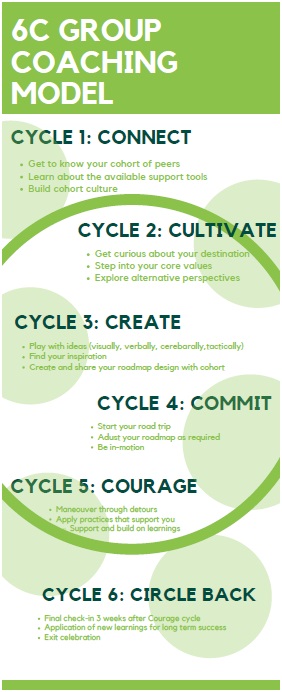A Coaching Model Created by Pascale Gonthier
(Career Coach, CANADA)
 Introduction
Introduction
Outside of the field of team sport coaching, the concept of coaching can be perceived to be a one-on-one engagement reserved as a privileged benefit. A service offering targeted at a selective few who have financial resources to invest in personal development. In the corporate world, some companies subsidize or even fund Executive Coaching for their leaders. In either scenario, the personal coaching modality is primarily an individual endeavor requiring a financial investment that is not available to everyone.
The purpose behind the 6C Group Coaching model is to make coaching financially accessible to anyone who wants to experience the benefits of being coached. The economy of scale provided by a group setting can reduce the cost of entry thereby increasing the accessibility of coaching to a wider audience from business, to individuals seeking meaningful and affordable coaching.
Explanation of the Model
The program is facilitated by a Certified Professional Coach (CPC) who will use the International Coaching Federation (ICF) Core Competencies[1] to create the structure and support for the group. The 6C Group Coaching model is broken down into 6 cycles and executed in10 sessions spread across 12 weeks. The 6 cycles are: Connect, Cultivate, Create, Commit, Courage, and Circle back. The first and last cycle are both 1 session each, the other three cycles will each be comprised of 2 sessions. The sessions are1.5 hours in length and scheduled bi-weekly except for the last cycle “Circle Back” which will be 3 weeks after the Couragecycle. There will also be two 20 mins one-on-one calls between the client and the Coach, one at the beginning and the second in the middle.
Logistically, the group will be dialing into a virtual call with video. The size of the group also referred to in this model as a cohort, will not exceed six participants, nor be less than three. The content of each 6C program will contain a generic theme for structure, yet the agenda of each session will be largely guided by the client via a checking-in protocol at the start of each session. This will enable the Coach to adapt to the individual needs while also guiding the flow and focus of the group synergies on the topic of the session.
The sessions will be facilitated by a CPC who is partnering with the group to discover self-knowledge, create forward movement, and actions. The clients will design a personalized plan while benefiting from hearing and supporting their cohorts through theirs.
The CPC coach will complement their coaching skills with tools and referenced training material to assist clients on their journey. Jennifer Britton, author of five books and a global leader in group coaching believes that group coaching is created by a foundational weave of coaching, facilitation, and training[2]. In the 6C model, the CPC Coach will blend all three of these group processes into the sessions with an emphasis on coaching as the primary method of delivery.
The 6C Group Coaching Program Themes
For the Corporate audience, the three themes of the Group Coaching cohort are:
- New to Management
- Professional Growth
- Transformational Leadership
For the non-corporate audience, the three themes of the Group Coaching cohort are:
- New HabitMindset
- Career Transition Support
- Personal Strength building
The participants in either audience segment must be a willing client. To determine that, each registrant will complete a 6C Group Coaching Discovery Survey followed by 20 mins 1 on 1 call with the coach. Should the coach uncover indications that the client is joining by delegation or obligation the participant will be offered alternative options.
The 6C Group Coaching Stages
Cycle 1: Connect
The goal is to build the foundation of a safe space that fosters trust and respect to build a community of support.
Objectives
Cycle 2: Cultivate
The goal is for the clients to explore and discover what is meaningful for them to achieve in the program.
Objectives
Cycle 3: Create
The goal is to create a roadmap plan.
Objectives
Cycle 4: Commit
The goal is to start executing on the plan through a meaningful accountability and support structure.
Objectives
Cycle 5: Courage
The goal is to maintain momentum, adjust individual goals, and roadmaps as required.
Objectives
Cycle 6: Circle Back
The goal is to reconnect and offer coaching support tailored to the issues, and successes of the cohort.
Objectives
Conclusion
The 6C Group Coaching model is an affordable and meaningful group coaching service that is accessible to many. Its structure enables scalability for the Coach practitioner while maintaining a general theme to provide the focus and forward movement toward the desired outcome. As the 6C model is applied, new learnings can easily be integrated into the structure to improve on its effectiveness to bring individual growth while in-community with others.
Reference
[1]International Coaching Federation, https://coachfederation.org/core-competencies
[2]Britton, Jennifer “Effective Group Coaching: Tried and Tested Tools and Resources for Optimum Group Coaching Skills”, p.21, John Wiley& Sons Canada, Ltd, 2010